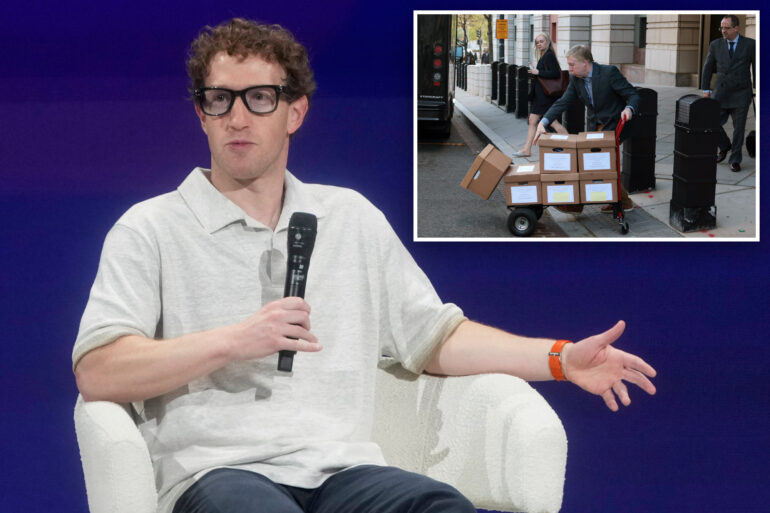🔴 Website 👉 https://u-s-news.com/
Telegram 👉 https://t.me/usnewscom_channel
Meta’s fate is up in the air after Mark Zuckerberg’s dirty laundry was aired in a landmark antitrust trial brought by the Federal Trade Commission – though some experts warn that the social media giant could wriggle out of the breakup sought by regulators.
The seven-week trial concluded Tuesday after multiple bombshells about Meta’s inner workings – including a 2012 email in which Zuckerberg admitted buying Instagram would “neutralize a competitor” and internal reports showing executives panicking that Instagram was steering minors toward adult sex creeps it called “groomers.”
Despite the embarrassing evidence, the case’s outcome is expected to hinge on how US District Judge James Boasberg defines the market in which Meta operates.
The FTC argued that Meta has an illegal monopoly over a narrowly-defined market of social media firms built on friends-and-family connections, with Snapchat as its only real competitor.
Meta pushed back, arguing its apps face tough competition from rivals like TikTok and Google-owned YouTube for user attention.
Meta has called the FTC’s case “weak” and, in a show of confidence, wrapped up its defense earlier than expected last week after calling just a few witnesses.
That’s a signal that its lawyers see the market definition issue as a strong argument against a breakup, according to Christine Bartholomew, an antitrust expert and professor at University at Buffalo School of Law.
“In a monopoly case, the victor of the dispute on how to define the market is often the overall victor,” Bartholomew said. “Like most defendants in these kinds of cases, Meta is arguing the market is broader. The larger the relevant market, the less the potential anticompetitive impact of Meta’s alleged conduct.”
The FTC has accused Meta of using a “buy or bury” strategy to stifle upstart social media apps like Instagram and WhatsApp before they could threaten its social media empire.
The agency wants a forced selloff of Instagram, acquired for $1 billion in 2012, and WhatsApp, acquired for $18 billion in 2014.
The smoking-gun emails are the strongest part of the FTC’s case, according to Bartholomew. In one 2018 message, Zuckerberg mused on whether Meta should “consider the extreme step of spinning Instagram out” to get ahead of regulators.
“They confirm the FTC’s narrative that Meta’s acquisitions were intended to minimize competition,” Bartholomew said. “These were not deals meant to improve a product or enhance consumer benefit. Rather, they were acquisitions meant to shield Meta from perceived competitive threats.”
The FTC declined to comment.
“After six weeks trying their case to undo acquisitions made over a decade ago and show that no deal is ever truly final, the only thing the FTC showed was the dynamic, hyper-competitive nature of the past, present and future of the technology industry,” a Meta spokesperson said in a statement.
During the trial, Instagram co-founder Kevin Systrom testified that Zuckerberg had treated his app as a “threat” to the company’s core Facebook business.
Systrom said he felt Zuckerberg had starved Instagram of necessary resources, including approving necessary headcount to improve safety standards on the app in the wake of the Cambridge Analytica data privacy scandal.
Meanwhile, Zuckerberg and Meta argued that Instagram’s rise to prominence wasn’t a sure thing – and that the company helped rather than hurt its growth.
The company’s attorneys also petitioned the judge to toss the case mid-trial, arguing the FTC had failed to meet its burden of evidence.
Boasberg rejected the petition.
While the final outcome is difficult to predict, cases focused on potential violations of Section 2 of the Sherman Act – where liability hinges on whether a monopoly exists over a specific market – face a high bar to prove and are notoriously difficult to win.
“There are too many ways a plaintiff can lose,” Bartholomew said.
With in-person arguments wrapped up, attorneys for the FTC and Meta will next submit written briefs outlining their arguments for and against a breakup for the judge’s review.
Boasberg has said he will move “expeditiously” to issue a ruling in the case.
If the judge rules in Meta’s favor, the FTC is expected to appeal.
If the judge sides with the FTC and determines Meta has broken the law, a second trial would be held to decide appropriate remedies. Meta would assuredly appeal.

